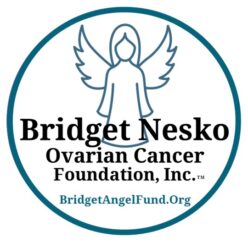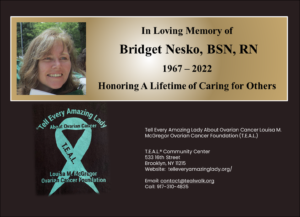The Truth About Ovarian Cancer – What YOU Need to Know
The following are basic but critical Rules of the Road in confronting the possibility of having ovarian cancer:
- Family history – If you have a family history of ovarian cancer, you are already predisposed to having the illness yourself. Make sure you keep the following on the top of your radar:
- Trust yourself and your instincts – You know yourself and your body better than anyone. If you feel that something is not right, you probably ARE right.
- Know the symptoms – Early ovarian cancer rarely has symptoms. As the disease progresses, some symptoms may appear. These include:
- Bloating or pressure in the belly, swelling in your belly/abdomen area.
- Pain in the abdomen, back, kidney area or pelvis area for no apparent reason, like exercise, or overdoing tasks.
- Appetite and stomach issues, including trouble eating, loss of appetite, feeling full more quickly than you should, an upset stomach or heartburn.
- Bladder and Bowel Issues, including urinating more frequently, feeling like you need to urinate urgently or more frequently, constipation.
- Fatigue. Getting tired more easily and being tired more frequently.
- Pain during sex.
- Unexplained weight changes — losing weight without trying, or bloating that seems like weight gain.
- Unusual vaginal discharge or bleeding, especially after menopause.
- Do Your Homework – Learn everything you can by visiting the following websites: The National Ovarian Cancer Coalition, The American Cancer Society, Memorial Sloan Kettering Cancer Center, and The Ovarian Cancer Research Alliance, Inc.
- Shop for the Right Team with a History of Wins, Before You Invest More Precious Time or a Co-pay – It’s not about money – it’s about time and your life. Take the time to contact every gynecological oncologist in the book, get references from friends and neighbors, contact a local hospice program case manager and see if you can get a reference of known practitioners, vet the names you do have through them (and get a sense of their reaction to the names you mention). And of course, contact your insurance company – if you have one. It’s about more than being in NETwork – it’s about making It Work to save your life.
- Research the Selected Team Before You Meet – State Medical Boards – or even Google – can provide you with some critically important background information about your team’s members, including if they have had their license suspend in the past and why, the number and type of malpractice lawsuits they have had brought against them, and simple patient feed-back. If you find troubling issues – find another team or ask the team members to explain the nature and outcome of the complaint. Rely on your instincts to judge the answers you get.
- Test Your Practitioners – If you know more about ovarian cancer than your medical team, you need a different medical team. This isn’t about being nice, polite, or loyal – this is about saving your life.
- Be blunt and ask them to do the same – After you have selected a team, ask your medical team and lead oncologist to be deadly frank about your condition, treatments and probability of outcome. Ask them how many cases of ovarian cancer they are currently treating or have treated in the last 12 months; ask them how many successful cases they have had over the last few years and what they have found to be the most effective means of hitting the cancer head-on. Remember – your desired outcome – is life.
Download and print the following brochure to track your own signs and symptoms of possible ovarian cancer to share with your healthcare team. A copy of that brochure can be mailed to you (one or in quantities) upon request free of charge by contacting us at Director@BridgetAngelFund.Ord or by phone (not text), at (856) 595 2184.
Bridget Nesko – OC Report Card
If You Are Diagnosed, Then What?
While the Foundation develops its educational digital content and information sharing programs, there are a number of excellent nonprofit organizations dedicated to providing information and support to victims currently suffering from ovarian cancer.
It is not our intent to replicate those services.
We suggest that you contact the following:
Tell Every Amazing Lady About Ovarian Cancer Louisa M. McGregor Ovarian Cancer Foundation: T.E.A.L.® stands for both Tell Every Amazing Lady About Ovarian Cancer Louisa M. McGregor Ovarian Cancer Foundation and for Teal, the color that symbolizes ovarian cancer.
 In 2023, we proudly took part in an educational global partners meeting at which they aired a panelist discussion about the impact of ovarian cancer on caregivers. Bridget’s husband Kevin was proud and honored to be selected to join that discussion, which aired on November 28th – consequently one year to the day on which Bridget lost her life to ovarian cancer.
In 2023, we proudly took part in an educational global partners meeting at which they aired a panelist discussion about the impact of ovarian cancer on caregivers. Bridget’s husband Kevin was proud and honored to be selected to join that discussion, which aired on November 28th – consequently one year to the day on which Bridget lost her life to ovarian cancer.National Ovarian Cancer Coalition: Founded in 1991, the mission of the National Ovarian Cancer Coalition (NOCC) is to save lives through the prevention and cure of ovarian cancer and to improve the quality of life for survivors and their caregivers. The Bridget Nesko Ovarian Cancer Foundation was a sponsor of an NOCC regional area event in 2023.

 Bridget’s Foundation strongly recommends this organization as a source of information and support, and has funded the placement of a commemorative plaque in their Brooklyn, N.Y. headquarters as a permanent mark of our commitment to support their organization.
Bridget’s Foundation strongly recommends this organization as a source of information and support, and has funded the placement of a commemorative plaque in their Brooklyn, N.Y. headquarters as a permanent mark of our commitment to support their organization.